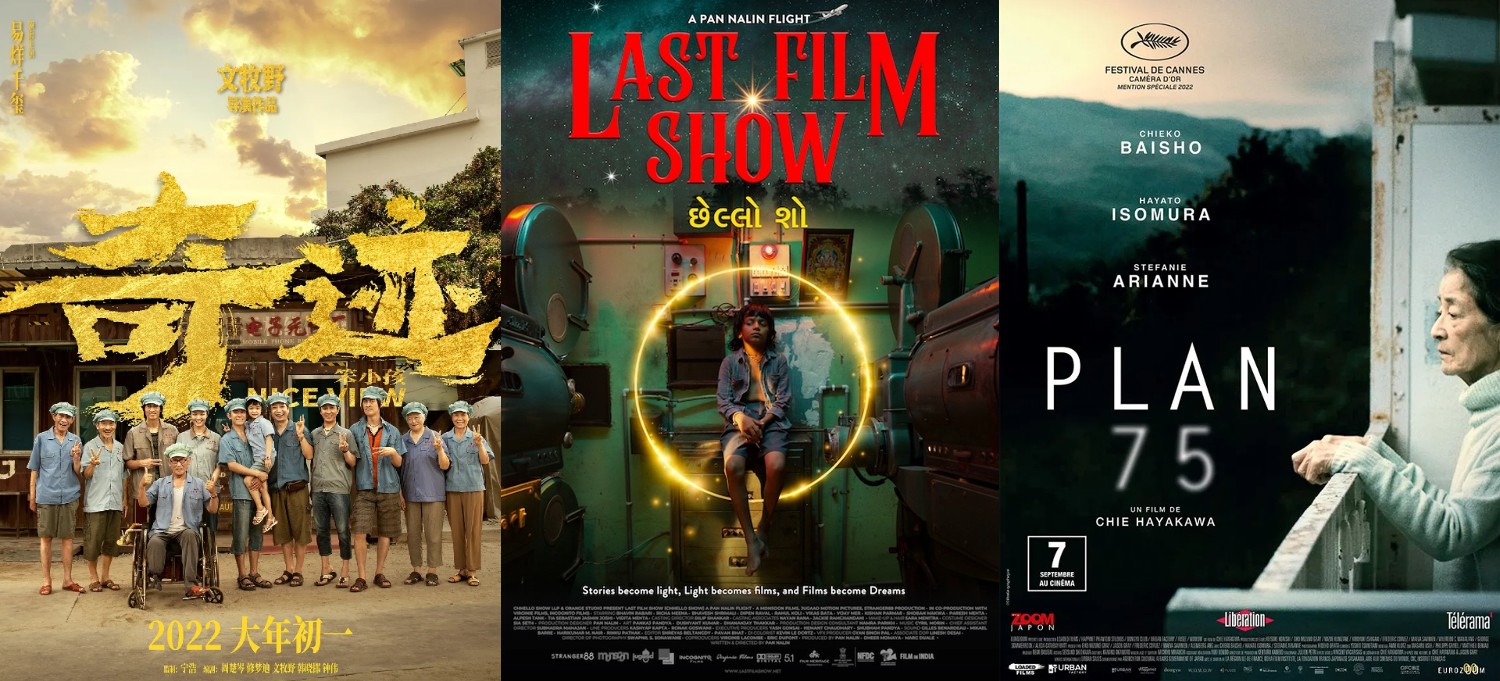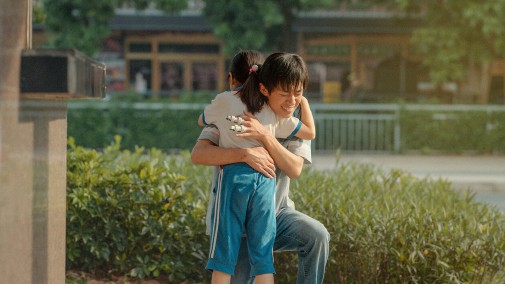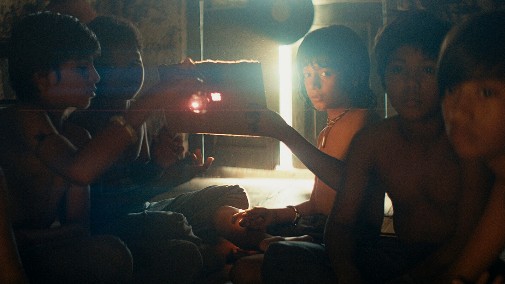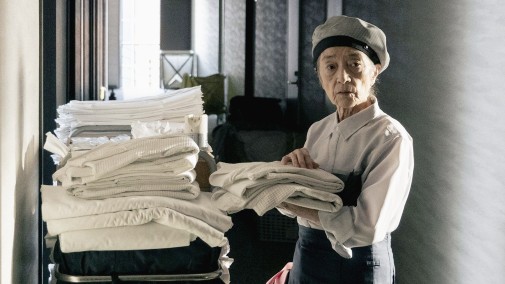Best International Film Reviews: China, India, and Japan
 Friday, December 16, 2022 at 2:59PM
Friday, December 16, 2022 at 2:59PM 
For many, this year's Best International Film race will forever be remembered with an added asterisk, a reminder that the outcome would have been different had India submitted RRR instead of Last Film Show. This is not a commentary on artistic quality, merely award prognostication. The action blockbuster keeps racking up honors, while the country's official submission remains under-discussed. If neither succeeds, it will continue a sad Oscar trend. As one of the world's leading film industries, it's notable how little India has factored in these awards' history, indicating AMPAS' biases as well as India's own sometimes surprising submission choices.
While considering India's fate, let's also peruse the titles selected by Asia's other major film-producing nations…
NICE VIEW (China)
 © Shenzhen Media Film & Television
© Shenzhen Media Film & Television
The last time a Jackson Yee movie was submitted in the Oscar race, we ended up with one of the most unexpected nominations of recent vintage. Not that Nice View and Better Days are significantly similar. Indeed, Yee's performances couldn't be more distinct in tone. The 2020 Hong Kong teen melodrama saw the actor take on a taciturn role, letting bruised vulnerability blossom from a violent milieu. This year's Chinese dramedy, directed by Muye Wen, requires a much more mundane register, far removed from the blood-splattered mystery of the other project. Thankfully, the young star's charisma carries through as the foundation for a soppy sentimental tale that doesn't have much to recommend it for besides its leading man.
He is Jing Hao, a 20-year-old who lives in the city of Shenzhen with his little sister. Their mother is gone, fallen victim to the same malady that now affects her daughter, a situation worsened by the family's strained finances. There's a surgery that might save the girl's life, but no money to pay for it. Then, thanks to luck or perchance fate, Jing Hao comes across a business opportunity while working at the phone repair shop that gives Nice View. It's a risky gamble, and there are setbacks aplenty, but an entrepreneurial spirit paired with the community's help may pave the way to a happy ending. Perseverance is the ruling ideal, a tenet value defining the picture's moral messaging ways, its inspirational aspirations, and feel-good tendencies.
If you've ever dipped your toes in the pool of modern China's mainstream Pablum, Nice View won't provide any surprises, following every cliché in the book with a preacher's zealotry. Chao Huang's score, for example, is so saccharine you might want to book a dentist appointment after finishing the movie. Still, the cast is generally solid, with Jackson Yee providing star quality, and there's a dewy prettiness to the way cinematographer Chao Huang films labor. After all, it's not often that one finds a movie this invested in making phone repair and dismantlement look like fine arts. In the end, Nice View is a piece of deadly-earnest, near-propagandist, corny-as-hell schmaltz that, for better and for worse, accomplishes what it aims to achieve. C-
LAST FILM SHOW (India)
 © Samuel Goldwyn Films
© Samuel Goldwyn Films
Before Last Film Show even starts, a title card showcases a picture of the director's parents and a message of gratitude. Other recipients of special thanks include the Lumière brother, Muybridge, and the like. If that doesn't prepare you for the kind of project Last Film Show is, nothing will. Suffused with a sincere adoration for the movies, this is one of those love letters to the medium that are so popular nowadays. Only, Nalin isn't as strictly interested in autofiction as some of his contemporaries. Sure, there's a lot of memoirist intent guiding the picture, its locations and familial dynamics. Still, the path followed feels more closely related to Tornatore's Cinema Paradiso than Spielberg's The Fabelmans.
Rather than ponder the period of his childhood, Nalin updates his story to the early 2010s, when cinema was completing its transition from celluloid to a world where digital reigns supreme. That change is dramatized within this Last Film Show, often with horror, as when a flurry of wordless visions detail how discarded filmstock is melted down into plastic knickknacks, projectors cut up to make cheap cutlery. Before that cataclysm arrives, however, the audience must learn to appreciate cinema, including its physical form, as the director does. Light plays a major role too. According to the characters themselves, from light come stories and from stories come movies. In the case before us, the story birthed from radiance is that of a nine-year-old whose name means time.
He's Samay, a youth from Chalala who spends his days between school – though he plays truant more often than not – and working for his tea seller father by the railway track. One day, the patriarch takes the family to watch a rare movie that honors his religious beliefs. It's Samay's first into the magic world of moving pictures, and it's love at first sight. From then on, momentary passion leads to a life-changing obsession. Making a deal with the reedy projectionist, he trades his mother's homecooked meals for free screenings and a cinematic education soon put to the test when the boy and his friends form an illicit movie club. From junk, they make a hand-cranked projector with which they play stolen reels.
The film dances on the precipice of mawkishness throughout, avoiding such pitfalls by appealing to bittersweet emotions, economic tensions, and a general mercilessness regarding its social portraiture. Instead of unrefined nostalgia, Last Film Show aims for something more painful – an elegy. In contrast, one also denotes gleeful invention underlining the project's best passages, whether replicating Samay's creative discoveries or capturing the poetry of everyday occurrences. A rainbow of vegetables lovingly cooked, light philtered through shards of colored glass, a prison's walls, and a train's steady movement – everything is a possible source of cinema. Nothing is too inconsequential when procuring material for spectacular image-making.
At last, no consideration of Last Film Show would be complete without a mention of the picture's MVP. He is Swapnil S. Sonawane, the cinematographer behind the movie's breathtaking sights, glowing frames brimming with burnished color and spellbinding plasticity. In the hands of such an artist, how could anyone resist falling in love with the movies? B+
PLAN 75 (Japan)
 © Urban Factory
© Urban Factory
No event in modern history has better exposed society's disregard for the elderly than the global pandemic. Those far from the flower of youth are often seen as burdens, abandoned by the world at large, thus doomed to live lonely lives, their day-to-day existence made even more difficult by the system's dysfunctions. Often, institutions are more concerned with the pragmatic disposal of older people than invested in keeping them alive, healthy, happy. So it's fair to say that although the origins of Chie Hayakawa's Plan 75 may precede the calamity of COVID-19, the context in which it arrives only makes the film's themes more harrowing.
Expanded from a short film that the director completed in 2018 under the mentorship of Hirokazu Kore-eda, this drama envisions a dystopian tomorrow not too distant from our today. In this imagined Japan, a government plan encourages citizens older than 75 to choose euthanasia, thus freeing younger generations of the responsibility to care for them and thus helping remedy the fate of a rapidly aging nation. Such incentives as a monetary reward push people into taking the decision, an entire network of workers ensuring the participants do not back down at the last minute. A lack of investment in social services indirectly tips the scales, making it near impossible to choose life when death is so much easier.
The ideas explored in this bleak scenario are complicated to an unimaginable degree, verging on demonizing assisted suicide at a point where the issue is so hotly debated worldwide. Moreover, the danger of drawing strict generational lines, decrying some as victims and others as youthful oppressors, feels just as troublesome. Thankfully, Plan 75 is drawn out on humanistic terms, using diverse perspectives to empathize with people across the callous system. No individual is a monster, and the narrative's underlying outrage targets only the system. Specifically, the film divides its attention between three protagonists.
Michi is an elderly woman facing unemployment and homelessness. On the other hand, Hiromu is a twenty-something who works in the program, finding his uncle among the participants. Finally, there's Maria, a Filipino immigrant who finds herself better compensated to process the dead than care for the living, an opportunity this mother of an ailing child can't refuse. The camera sometimes follows other people that intersect its principal storylines, like the growing despair of Michi's case worker. Upon breaking the rules and meeting with the woman she's supposed to guide into premature death, this wheel in the bureaucratic clockwork is made to rethink her actions.
Even then, Plan 75 acknowledges the difficulty of going against social structures so much bigger than singular people, miring its political urgency with a sense of hopelessness. From an early reference to the Sagamihara stabbings to a sunset finale, the film oscillates between sublimated anger and outward melancholy, trying to find a balance it never quite strikes. Another unbalancing element is how little Maria factors in the story despite being a putative protagonist. Even so, thanks to its subdued approach, Plan 75 somehow makes the underlying violence of its scenario feel more immediate than it would have otherwise registered.
Amidst it all, Chieko Baishô's performance as Michi is an outstanding achievement, delineating a soft-spoken characterization whose gentle demise is bound to break the viewer's heart. Watching her plight, it's tempting to compare Plan 75 to both versions of The Ballad of Narayama, other meditations on Japan's handling of its aging population. Only while those films looked at a folkloric past, Hayakawa's vision regards the future. In both cases, the narrative is about the presence, holding a mirror to the audience. B
Oscar odds? If voters bother to watch Last Film Show, it could be a strong contender regardless of the RRR-snubbing controversy. Indeed, I wouldn't be too surprised if it made the shortlist and, from there, it secured an unexpected nomination. It's just the kind of narrative one imagines the Academy would gravitate toward IF they give it a chance. China's Nice View feels DOA, though its sentimental factor might charm a considerable percentage of voters. Sadly, Plan 75 is too bleak and low-profile to make it far in the race. Still, one never knows, and Japan's recent triumph with Drive My Car may lead viewers to pay special attention to their follow-up submission.


